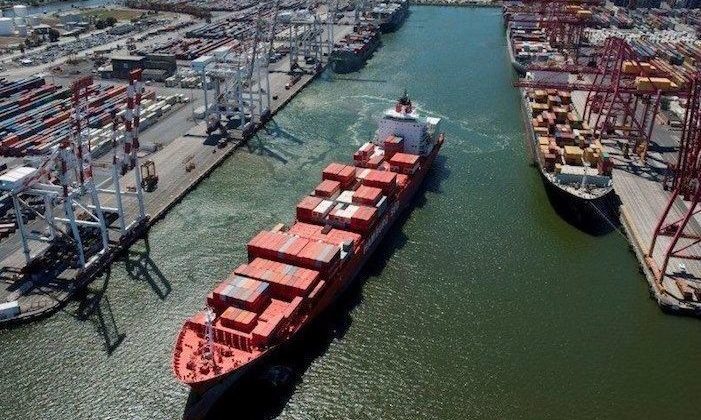In logistics, trust is still a four-letter word, but that’s changing

Stefan Kukman, the founder and CEO of CargoX, writes exclusively for Splash today.
A few years ago, logistics companies would have been flabbergasted if a partner asked them to share trading data. You never knew whose hands it would fall into, so everyone kept their cards close to their chests.
Even with the prospect of saving thousands of dollars and shaving up to a week off of the time it took to transmit trade documents, some shippers preferred to pay a courier to do the job. Nobody has to stick out their necks, and there’s a perceived security.
That’s all changing now, and these days, it’s the shippers and forwarders who are looking to take risks to get ahead. But it’s worth examining how things got so bad, and what it’s going to take to change that paradigm of mistrust because we still have a long ways to go.
An uphill battle
There is an industry-wide fear of collaboration. Companies are worried that their data will fall into the wrong hands, or be used against them by competitors. Customers don’t trust their vendors, forwarders don’t trust shippers, and nobody trusts the carriers. It’s not a pretty picture. That’s because forwarders leverage provider rate cards against their customers, booking websites sell the customer’s data to third parties, and carriers use 3PL relationships to influence provider allocations.
People are right to be cautious. Margins in this business can be tight and the right data, no matter how you get it, can make all the difference. Companies guard it closely.
So what can the industry do to earn the trust of shippers and forwarders?
It’s quite simple really. We need to make the connection between proven technology (blockchain) and results (full control over who can see what data). That means we, as an industry, need to do more than simply develop and deploy awesome technology — we need to do a better job of explaining how it works. It’s much like the way that people didn’t trust banks until they understood that the vault was safer than keeping their savings in the mattress. Vaults keep money safe, just like blockchain keeps data safe.
Moving from the lab to the real world
There are already thousands of articles published showing how blockchain allows users to control who sees the data they share and how much. Countless innovators have shown how blockchain’s immutable ledger leaves an unforgeable signature, which details exactly who altered the blockchain, and how.
In addition, each party has permission to see content which is relevant to the work they need to perform – and nothing more.
Taken together, these advantages make blockchain a powerful tool, but what receives less attention are the practical applications of these security features, and there’s a reason for that. It turns out, the logistics industry is still putting them into practice. So while we know that blockchain “creates trust” in theory, shippers and forwarders are finally getting to see it in action, and the results are exciting!
What’s changed?
In short, shippers and logistics companies have finally begun to see how blockchain empowers provider neutral solutions! There’s a democratic appeal. Nobody wanted to risk their data with supply chain partners in the past, because they knew that data could be used against them to drive up prices or sold to competitors. Now that these companies understand that blockchain does, in fact, protect their data, they are taking the next step, which is experimenting with blockchain-based platforms that allow different parties to collaborate in a single system with carriers, 3PLs, customs agents, specialty warehousing firms, and even banks. And as long as the platform is neutral and protected, they feel safe.
It actually works!
Logistics companies are just as excited about this new technology as we are. Recently, CargoX teamed up with Milsped Group to test some of the features of our blockchain-based platform. I’ve spent decades in the logistics industry, and it still amazes me to see established forwarders so eager to team up with logistics startups.
We’re not alone, and that’s a good thing. We already know that competition drives innovation. The gold-rush into blockchain logistics is evidence that the industry has made a choice. With each new startup that enters the space, investors are voting with their dollars, and they are casting their ballots in favor of blockchain.
It’s not all fun and games testing software like ours, and the willingness of forwarders and shippers to work with startups as they develop their platforms speaks to a new era of cooperation. It turns out the industry wanted to cooperate all along, we just didn’t have the tools. Now we do.
What’s next?
It’s critical that software developers get permissions right because our customers are putting a lot of trust in this new technology. We talk with shippers and forwarders every day who complain about how insecure and leaky their emails and internal networks are, and that’s why the industry is looking to blockchain to shore up security.
As supply chains grow increasingly digitalized, experts are warning that new technology is creating vulnerabilities, due to poor deployment, lack of training and awareness, and weaknesses in the solutions themselves. Blockchain is just the latest in a long line of exciting new technological developments, but even though the underlying system has proven itself to be impenetrable, we can’t rest on our laurels. If we’re going to change the world, we need to start with people.
